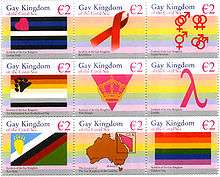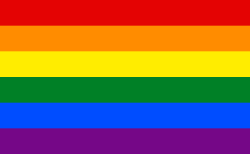Gay and Lesbian Kingdom of the Coral Sea Islands
| Gay & Lesbian Kingdom of the Coral Sea Islands Micronation |
||||
|---|---|---|---|---|
|
||||
| Anthem: Zadok the Priest[1] | ||||
| Location | Coral Sea Islands Territory | |||
| Capital | Heaven, Cato Island | |||
| Official languages | English | |||
| Membership | LGBT people | |||
| Organizational structure | Constitutional monarchy | |||
| • | Emperor | Dale Parker Anderson | ||
| Establishment | ||||
| • | Founded | 14 June 2004 | ||
| Purported currency | Euro[2] | |||
The Gay and Lesbian Kingdom of the Coral Sea Islands (also known as The Gay Kingdom of the Coral Sea - for example on postage stamps) was established as a symbolic political protest by a group of gay rights activists based in Australia. Declared in 2004 in response to the Australian government's refusal to recognise same-sex marriages, it was founded on Australia's external overseas Territory of the Coral Sea Islands, a group of uninhabited islets east of the Great Barrier Reef.[3] It is an expression of queer nationalism.
History

Founded in June 2004, the Gay and Lesbian Kingdom of the Coral Sea Islands was created by a group of gay protesters against the refusal of the Australian government to acknowledge same-sex marriages. They chose the Coral Sea Islands Territory as their location. The island chosen for their capital is the largest island in the territory, Cato Island. The leader of the protesters, Dale Parker Anderson, was elected Administrator of the territory and then "declared emperor" of the kingdom upon its independence, becoming Dale R. Other than the protester inhabitants, the islands of the Coral Sea Islands Territory are uninhabited and the kingdom's independence is not recognised by Australia or any world government. The Coral Sea Islands are recognised as an external overseas Territory of Australia by the United Nations.[4][5][6] On 13 September 2004, the Gay Kingdom declared war on Australia.[7]
On Cato Island, the settlers founded a camp site they named "Heaven" after the famous gay nightclub in London, and set up a post office where they obtain funds for the kingdom by "selling its unique coins and stamps".[5]
In May 2010, Dale Anderson was invited to (but did not attend) a conference in Sydney for the leaders of all the micronations in the world, in order to determine ways to obtain recognition as sovereign countries. The Gay Government announced that the Emperor would not be attending the conference on the grounds that the Gay and Lesbian Kingdom of the Coral Sea Islands being a former overseas external Territory of Australia was not a micronation.[3]
The independence of the kingdom is based on Australia being guilty of "unjust enrichment", because of the government’s plan to amend the marriage act so as to prevent homosexual couples who were married overseas to have their relationship recognised. The law of “Unjust Enrichment” states: “If something is unjustly taken compensation must be made.”
The gay activists believe that the change in the marriage law has taken from homosexual people the right to be treated equally, “whether it be marriage, superannuation, hospital visits, adoption or IVF treatments”. Instead of financial compensation, the activists have chosen “territorial compensation” by establishing an independent gay state on a scattering of tropical islands in the Coral Sea.
The initiative for the founding of a gay kingdom was taken during the Brisbane Gay and Lesbian Pride Festival. The Coral Sea Islands were chosen because of a provision of international law that states “Oppressed people of overseas territories have a right to self government and self determination”. For a long time these islands were administered as an overseas territory of the United Kingdom, but from the 1960s they were administered from Australia by the Department of the Environment, Sport and Territories as an overseas external territory of the Commonwealth of Australia.
The activists also presume that neither the United Kingdom nor Australia has any rights to the Coral Sea Islands, because neither government has provided to the gay government any recording of anyone proclaiming the Coral Sea Islands as part of the British/Australian Crown.
The Gay and Lesbian Kingdom raised the gay rainbow pride flag on Cato Island on 14 June 2004 and declared the territory an independent gay and lesbian state. A memorial plaque on the north eastern tip of Cato Island commemorates this historic event and reads:
- "On the 14th day of June 2004, at this highest point in the Coral Sea, Emperor Dale Parker Anderson raised the gay rainbow flag and claimed the islands of the Coral Sea in his name as homeland for the gay and lesbian peoples of the world. God Save our King!"
Declaration of Independence
Coinciding with the decision to secede from Australian sovereignty, the kingdom's founders drafted a declaration of independence.[8] The declaration begins,

“Homosexual people have honestly endeavoured everywhere to merge ourselves in the social life of surrounding communities and to be treated equally. We are not permitted to do so. In vain we are loyal patriots, our loyalty in some places running to extremes; in vain do we make the same sacrifices of life and property as our fellow citizens; in vain do we strive to increase the fame of our native land in science and art, or her wealth by trade and commerce. In countries where we have lived for centuries, we are still cried down as strangers.... In the world as it is now and for an indefinite period.... I think we shall not be left in peace.”[8]
Stated to have been inspired by its American counterpart, the kingdom's Declaration of Independence also stated: “We hold these truths to be self-evident, that all people are created equal, that they are endowed by their creator with certain unalienable rights, that among these are life, liberty and the pursuit of happiness.”[8]

Economy and tourism
The kingdom issued its first stamps in July 2006 "with the aim of creating a high and distinctive reputation amongst the philatelic fraternity". The kingdom's website says that tourism, fishing and philatelic sales are its only economic activities. However, swimming, reef walking, lagoon snorkelling, bird-watching, seashell-collecting, and shipwreck-exploring are all gay government-sanctioned non-economic activities.[2]
In a scheme similar to Israel's Law of Return, a person is automatically granted permanent resident status and is immediately eligible for citizenship in the Gay and Lesbian Kingdom of the Coral Sea Islands simply by being gay or lesbian.[2]
The kingdom's national anthem is "Zadok the Priest".[1]
See also
References
- 1 2 http://gaykingdom.info/introduction.htm
- 1 2 3 Ryan, John; Dunford, George; Sellars, Simon (2006). Micronations. Lonely Planet. pp. 39–40. ISBN 1-74104-730-7. Retrieved 10 August 2011.
- 1 2 Nick Squires (4 May 2010). "The world's micronations unite to demand recognition". The Daily Telegraph. Retrieved 10 August 2011.
- ↑ "Gay and Lesbian Kingdom of the Coral Sea Islands (Queensland, Australië)". Columbus. 22 June 2010. Retrieved 10 August 2011.
- 1 2 Talek Harris (22 July 2010). "Emperors, princes and Australia's league of mini-nations". Sin Chew Daily. Retrieved 11 August 2011.
- ↑ Nick Squires (24 February 2005). "Mini-states Down Under are sure they can secede". The Daily Telegraph. Retrieved 11 August 2011.
- ↑ http://gaykingdom.info/history.htm
- 1 2 3 Hans Hafkamp (13 January 2005). "Gay Kingdom Declares War On Australia". Gay-News. Retrieved 10 August 2011.
Further reading
- Dapin, Mark, "If at first you don't secede...", The Sydney Morning Herald – Good Weekend, 12 February 2005, pp 47–50
- Lattas, Judy, “Queer Sovereignty: the Gay & Lesbian Kingdom of the Coral Sea Islands”, Cosmopolitan Civil Societies journal, UTS September 2009
External links
| Wikimedia Commons has media related to Gay and Lesbian Kingdom of the Coral Sea Islands. |
